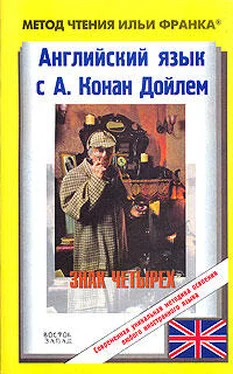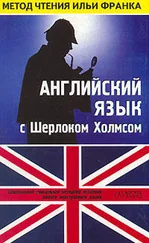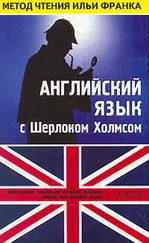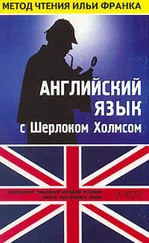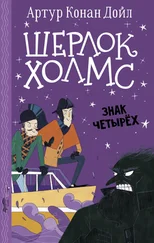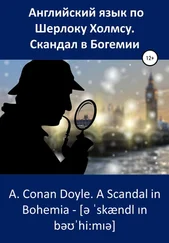sequel ['si:kw(@)l], identical [aI'dentIk(@)l], faulty ['fO:ltI]
"But this is mere speculation," said I.
"It is more than that. It is the only hypothesis which covers the facts. Let us see how it fits in with the sequel. Major Sholto remains at peace for some years, happy in the possession of his treasure. Then he receives a letter from India which gives him a great fright. What was that?"
"A letter to say that the men whom he had wronged had been set free."
"Or had escaped. That is much more likely, for he would have known what their term of imprisonment was. It would not have been a surprise to him. What does he do then? He guards himself against a wooden-legged man, — a white man, mark you, for he mistakes a white tradesman for him, and actually fires a pistol at him. Now, only one white man's name is on the chart. The others are Hindoos or Mohammedans. There is no other white man. Therefore we may say with confidence that the wooden-legged man is identical with Jonathan Small. Does the reasoning strike you as being faulty?"
"No: it is clear and concise (нет, они ясны и лаконичны) ."
"Well, now, let us put ourselves in the place of Jonathan Small (ну, а теперь давайте поставим себя на место Джонатана Смолла) . Let us look at it from his point of view (давайте посмотрим на это с его точки зрения) . He comes to England with the double idea (он приезжает в Англию с двойной целью; idea — идея; мысль; цель; план, замысел) of regaining what he would consider to be his rights (восстановить то, что он считает своими правами; to regain — обретать снова; восстанавливать; right — правота; rights — права; порядок, должное состояние) and of having his revenge upon the man who had wronged him (и отомстить человеку, который поступил с ним несправедливо; revenge — месть; to have revenge — отомстить) . He found out where Sholto lived (он нашел, где жил Шолто) , and very possibly he established communications with some one inside the house (и, вполне возможно, установил контакт с кем-нибудь в доме; communication — информация; знакомства, контакты) . There is this butler, Lal Rao, whom we have not seen (есть ведь этот дворецкий, Лал Рао, которого мы не видели) . Mrs. Bernstone gives him far from a good character (миссис Бернстоун отзывается о нем не очень-то лестно; character — характер; репутация) . Small could not find out, however, where the treasure was hid (но Смолл не смог узнать, где спрятаны сокровища; to hide — прятать) , for no one ever knew, save the major and one faithful servant who had died (так как этого никто не знал, за исключением майора и одного верного слуги, который умер) . Suddenly Small learns that the major is on his death-bed (внезапно Смолл узнает, что майор при смерти: «на своем смертном одре») . In a frenzy lest the secret of the treasure die with him (опасаясь, что секрет сокровищ умрет вместе с ним; frenzy — безумие, бешенство; неистовство; lest — чтобы не, как бы не) , he runs the gauntlet of the guards (он преодолевает заслон охраны; gauntlet — латная рукавица; прогон сквозь строй /вид наказания/; to run the gauntlet — проходить сквозь строй) , makes his way to the dying man's window (пробирается к окну умирающего) , and is only deterred from entering by the presence of his two sons (и только присутствие двух его сыновей помешало ему войти; to deter — удерживать) . Mad with hate, however, against the dead man, he enters the room that night (вне себя от ненависти к покойнику, он все же пробирается в комнату этой ночью; mad — сумасшедший, безумный) , searches his private papers in the hope of discovering some memorandum relating to the treasure (перерывает его личные бумаги в надежде обнаружить какую-нибудь записку, касающуюся сокровищ; to search — искать; обшаривать, обыскивать; memorandum — заметка, записка; to relate — относиться, иметь отношение) , and finally leaves a memento of his visit in the short inscription upon the card (и в конце концов оставляет напоминание о своем визите в виде короткой записки на листке бумаги; memento — церковное поминание; напоминание) . He had doubtless planned beforehand that should he slay the major (без сомнения он заранее планировал, что в том случае, если он убьет майора; doubt — сомнение) he would leave some such record upon the body as a sign that it was not a common murder (он оставит какую-нибудь подобную записку на теле как знак того, что это не обычное убийство) , but, from the point of view of the four associates, something in the nature of an act of justice (но, с точки зрения четырех сообщников, что-то вроде акта возмездия) . Whimsical and bizarre conceits of this kind (странные и причудливые записки такого рода; whimsical — причудливый, эксцентричный; bizarre — неестественный, причудливый, странный; conceit — самомнение, кичливость; причудливое сравнение, изощренная метафора) are common enough in the annals of crime (дело достаточно привычное в анналах преступности) , and usually afford valuable indications as to the criminal (и они обычно позволяют сделать ценные выводы относительно личности преступника; to afford — быть в состоянии; давать; indication — указание; намек, подсказка; criminal — злоумышленник, преступник) . Do you follow all this (вы следите за ходом моей мысли: «вы следите за всем этим») ?"
concise [k@n'saIs], deter [dI't@:], bizarre [bI'zA:], conceit [k@n'si:t]
"No: it is clear and concise."
"Well, now, let us put ourselves in the place of Jonathan Small. Let us look at it from his point of view. He comes to England with the double idea of regaining what he would consider to be his rights and of having his revenge upon the man who had wronged him. He found out where Sholto lived, and very possibly he established communications with some one inside the house. There is this butler, Lal Rao, whom we have not seen. Mrs. Bernstone gives him far from a good character. Small could not find out, however, where the treasure was hid, for no one ever knew, save the major and one faithful servant who had died. Suddenly Small learns that the major is on his death-bed. In a frenzy lest the secret of the treasure die with him, he runs the gauntlet of the guards, makes his way to the dying man's window, and is only deterred from entering by the presence of his two sons. Mad with hate, however, against the dead man, he enters the room that night, searches his private papers in the hope of discovering some memorandum relating to the treasure, and finally leaves a memento of his visit in the short inscription upon the card. He had doubtless planned beforehand that should he slay the major he would leave some such record upon the body as a sign that it was not a common murder, but, from the point of view of the four associates, something in the nature of an act of justice. Whimsical and bizarre conceits of this kind are common enough in the annals of crime, and usually afford valuable indications as to the criminal. Do you follow all this?"
Читать дальше
